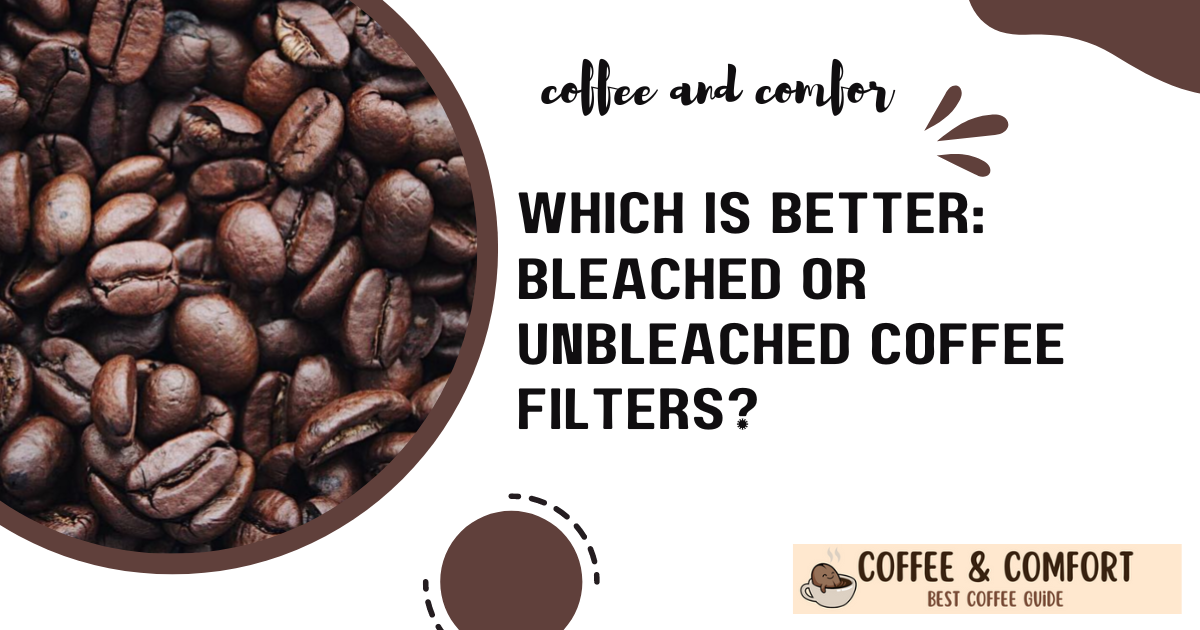Discover the pros and cons of bleached and unbleached coffee filters to find out which is the best choice for your morning cup of joe.
If you’re a coffee lover, you know that the type of filter you use can make or break your morning cup of joe. So, if you’re trying to decide between bleached and unbleached coffee filters, you’ve come to the right place. Let’s dive in and find out which one is the better choice!
Advantages of Bleached Coffee Filters
Advantages of Bleached Coffee Filters:
- More effective at removing impurities: Bleached filters are better at removing chlorine and other chemicals that can affect the taste and aroma of the coffee.
- Durable and consistent: They are less likely to tear or disintegrate during brewing, resulting in a cleaner and more consistent cup of coffee.
- Widely available and less expensive: Bleached filters are more widely available and typically less costly than unbleached filters.
- Convenient to use: They do not need to be pre-rinsed before brewing, making them more convenient.
- Improved taste and aroma: Bleached filters can improve the overall quality and taste of your coffee.
Disadvantages of Bleached Coffee Filters
Disadvantages of Bleached Coffee Filters
- The main disadvantage of bleached coffee filters is their potential environmental impact.
- bleaching process uses chlorine and other chemicals which can be damaging to the environment.
- bleached filters are not biodegradable and should not be put in compost piles.

Advantages of Unbleached Coffee Filters
- The main advantage of unbleached coffee filters is their environmental friendly nature.
- Unbleached filters are made of natural fibers and are biodegradable, making them a much greener alternative to bleached filters.
- they allow more oils and compounds from your coffee beans to pass into the cup, which can give the coffee a richer and more flavorful taste.
Disadvantages of Unbleached Coffee Filters
- The main disadvantage of unbleached coffee filters is that they are not disposable.
- This means that after each use, you need to clean the filter and let it air-dry before reusing it.
- due to the material used in their construction, unbleached filters can sometimes impart a slight taste to your coffee.

Final Considerations for Choosing Between Bleached and Unbleached Coffee Filters
When choosing between bleached and unbleached coffee filters, consider your needs and preferences. For convenience and no flavor transfer, bleached filters are the way to go.
However, if you’re looking for a more environmentally friendly option, then unbleached filters are the best choice.
Additionally, consider how often you’ll be making coffee, as this can help you decide which type of filter to purchase.
Frequently Asked Questions (FAQ)
Are bleached and unbleached coffee filters the same thing?
No, bleached coffee filters are chemically treated filters, while unbleached coffee filters have not been treated with any chemicals.
What is the difference between bleached and unbleached coffee filters?
The main difference between bleached and unbleached coffee filters is the chemical treatment. Bleached coffee filters are treated with chlorine or other chemical whitening agents to help make the filters appear whiter, while unbleached coffee filters have not been chemically treated.
Is one type of coffee filter better than the other?
It really depends on what you’re looking for in a coffee filter. Bleached coffee filters tend to be more uniform in shape, size and color, while unbleached coffee filters tend to be more natural and can vary in size and shape.
Unbleached coffee filters can also be more expensive than bleached coffee filters.
Which type of coffee filter should I buy for my coffee maker?
It’s really up to you. If you’re looking for a consistent, uniform filter, then you may want to go with a bleached coffee filter.
If you’re looking for a more natural, unbleached filter, then you may want to purchase an unbleached coffee filter.
Does the type of coffee filter affect the flavor of the coffee?
Yes, the type of coffee filter you use can affect the flavor and strength of your coffee. Bleached coffee filters tend to produce a lighter-bodied, less-flavorful coffee, while unbleached coffee filters can produce a fuller-bodied, richer-flavored coffee.
Are there any health benefits to using one type of coffee filter over the other?
Yes, unbleached coffee filters are generally considered healthier than bleached coffee filters as they are not treated with any chemicals.
Are bleached and unbleached coffee filters biodegradable?
Yes, both bleached and unbleached coffee filters are biodegradable.
Final Word
Ultimately, the choice between bleached and unbleached coffee filters is a matter of personal preference. Both types of filters are effective at filtering out coffee grounds, so it’s up to you to decide which one you prefer.

My name is Michael Jones, and I’m a coffee enthusiast and expert based in the US. I run my own coffee shop, and I’m passionate about everything related to coffee. On my website, Coffee and Comfort, I share my knowledge and tips to help you elevate your coffee experience. Whether you’re a beginner brewer or a seasoned barista, I have something for everyone. I’ll teach you how to choose the right coffee beans, grind them perfectly, and brew a delicious cup of coffee at home. I’ll also share tips on how to make different coffee drinks, like lattes, cappuccinos, and espressos. But more than just teaching you about coffee, I want to help you create a coffee lifestyle that you love. Coffee is more than just a beverage; it’s a way to connect with people and enjoy the simple things in life.
